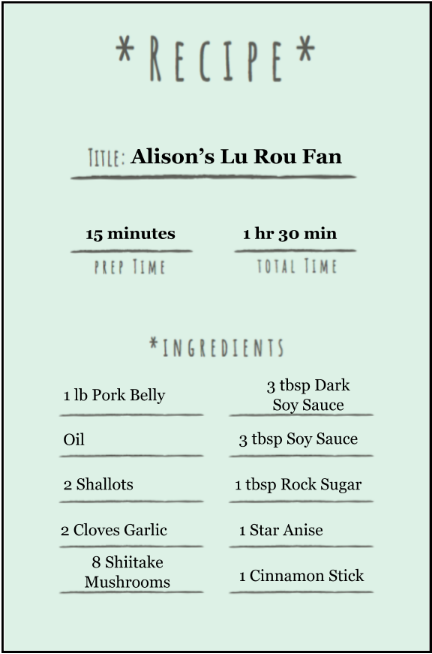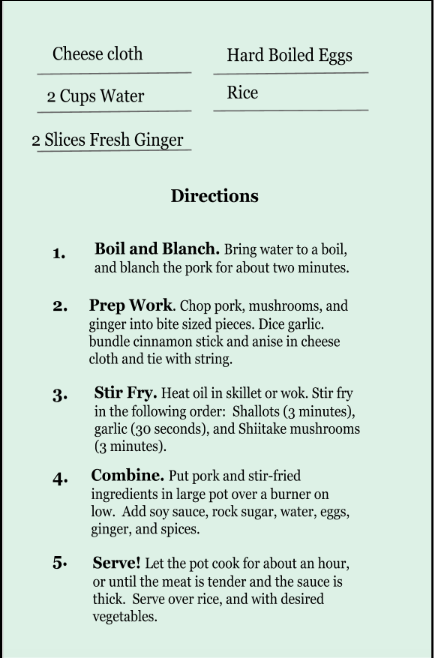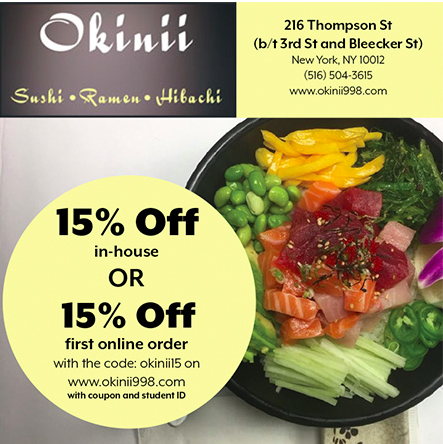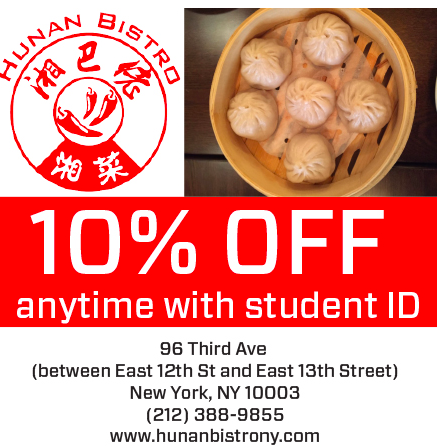The smell of sizzling pork and shallots wafts through the hallway, and I eagerly follow the smell by stepping into Room 914. My friend Alison is making Lu Rou Fan 滷肉饭–a beloved Taiwanese pork stew. I am eager to learn how to make the dish, which I have researched a bit beforehand.
The origins of Lu Rou Fan are disputed, however, most people claim the Han and Hakka people from China’s Fujian province brought this style of pork stew to Taiwan. In the 1850s, there was an influx of Fujianese settlers in Taiwan. These immigrants were mostly poor farmers who were creative about using the least appetizing animal parts. They discovered mincing pork and boiling it in soy sauce did the trick, and this was likely the beginnings of Lu Rou Fan.
There is a sensory overload in the kitchen. Alison’s roommate chats on the phone while carving a Jack-O-Lantern. A guest speaker for one of her engineering classes lectures about computer security. On top of this, a small speaker hums lofi music. This is an amount of multitasking I can’t wrap my head around, and I ask how she does it.
“Oh, ya know. I figure the class doesn’t take up much of my attention, and cooking doesn’t take much. So if I only did one thing it would just be a waste of time.”
Fair enough. I hope my interview will not be a task too many!
Alison is from the bay area in San Francisco, and I met her during my freshman year at NYU Florence. The first time we talked she told me she wanted to be an electronic music festival light designer. She is very hard-working, creative, and intelligent–I can hardly imagine her doing anything less innovative. However, as an overly modest person, she would likely refute my claims.
Turning the conversation to the cooking process, I ask what recipe she is using. Alison’s Lu Rou Fan is a combination of five or six recipes. She tells me it’s best to look up as many recipes as possible when making something new. By comparing different methods, you can distinguish the most important elements, and refrain from unneeded or unusual steps. This is particularly helpful for undergraduate cooks, because you may not need to buy all of the ingredients a certain recipe calls for (a great way to save money).
While Alison didn’t choose one recipe, she has written out guidelines on a sticky note pasted to her kitchen cabinet.
The pork, garlic, and mushrooms are cooking in a tall silver pot above the stovetop, and I watch as she takes the regular and dark soy sauce out from the cabinet. Alison encourages me to smell both. While the regular soy sauce has a familiar tangy smell, I recognize a sweet fragrance of the dark soy sauce (reminding me subtly of molasses).
Despite the precise measurements written on her post-it, these were estimates. Alison takes the lid off the pot and adds an amount of soy sauce that seems to look about right. She then turns to the prep work and throws in the spices and water.
After a few minutes of watching the pork bubble, we taste a piece to see how it is coming along. The pork is extremely flavorful, but Alison decides to add more dark soy sauce.
I comment on how confident she is with her cooking. In the past I have always mimicked my father’s style–he prints out recipes, lines up ingredients, and follows each step exactly. He used to tell me “you can’t make changes to a recipe until after you have made it five or six times.” While I find the organization very helpful when cooking, Alison has me questioning the mantra. She tells me cooking is about the feel. It is about your taste buds.
“According to that person from Epicurious, don’t be scared to taste test something in case it’s bad. You can always fix it while it’s cooking but it’s hard to fix it after you’ve cooked it.”
While waiting for the pork to become more tender, I ask her why she likes to cook. Alison tells me she cooks because sometimes she’s craving something that’s not in New York. For being such a diverse city, it seems almost unimaginable that any cuisine is unavailable.
“Lu Rou Fan reminds me of Taiwan. You can go to a night market and get this on rice for like a dollar fifty.”
“When you are in Taiwan, do you get a homey feeling? Or is it just a relaxing vacation?” I am curious about her drive to be closer to her parent’s home country.
“I definitely feel like it’s a homey feeling, but also it does feel like a vacation…So it’s like the perfect medium.”
This homey comfort is exactly what is inaccessible in New York City as a college student. Only you know what home tastes like–and cooking gives you the power to recreate it.
As we sit scrolling through culinary Facebook pages, I pause to consider the things Alison has taught me over the last few hours:
- Compare Recipes. This will allow you to understand the fundamentals of a dish better and will prevent you from buying ingredients you don’t need.
- Taste test. It is easier to fix things before food has cooked versus when it’s done.
- Trust your gut! You are usually cooking for yourself, and the only person who knows what your taste buds are tasting is yourself. Feel free to deviate from your intended instructions.
Using a fork, we fish two pieces of meat out of the pot. The pork has become extremely tender, and the entire apartment smells like soy sauce, cooked pork, and fragrant spices (even my clothes have absorbed the smell). Alison gives me a small container to take home, and I leave thinking about how much you can learn from your peers.


Sources:
Jeffrey Lin “The Origin Story of Taiwanese Lu Rou Fan aka Minced Pork Rice” (滷肉飯). Foodamentals, 21 Feb. 2018.
You can find all of our active coupons at this link. Redeem them here:
By: Erin Zubarik
Hello! My name is Erin Zubarik and I am a Junior at New York University majoring in Global Liberal Studies and minoring in Chinese and Italian. Over the last few years, I have been lucky enough to study abroad in Florence and Beijing, where I enhanced my language skills and became acquainted with lovely people. This fall I am primarily holed up in my apartment taking online classes, and playing with my hamster pork chop. I am very excited to share my cooking and relationships series this fall on Campus Clipper!
For over 20 years, the Campus Clipper has been offering awesome student discounts in NYC, from the East Side to Greenwich Village. Along with inspiration, the company offers students a special coupon booklet and the Official Student Guide, which encourages them to discover new places in the city and save money on food, clothing, and services.
At the Campus Clipper, not only do we help our interns learn new skills, make money, and create wonderful e-books, we give them a platform to teach others. Check our website for more student savings and watch our YouTube video showing off some of New York City’s finest students during the Welcome Week of 2015.
Tags: Campus Clipper, college, cooking, Erin Zubarik, lu rou fan, New York University, undergraduate




